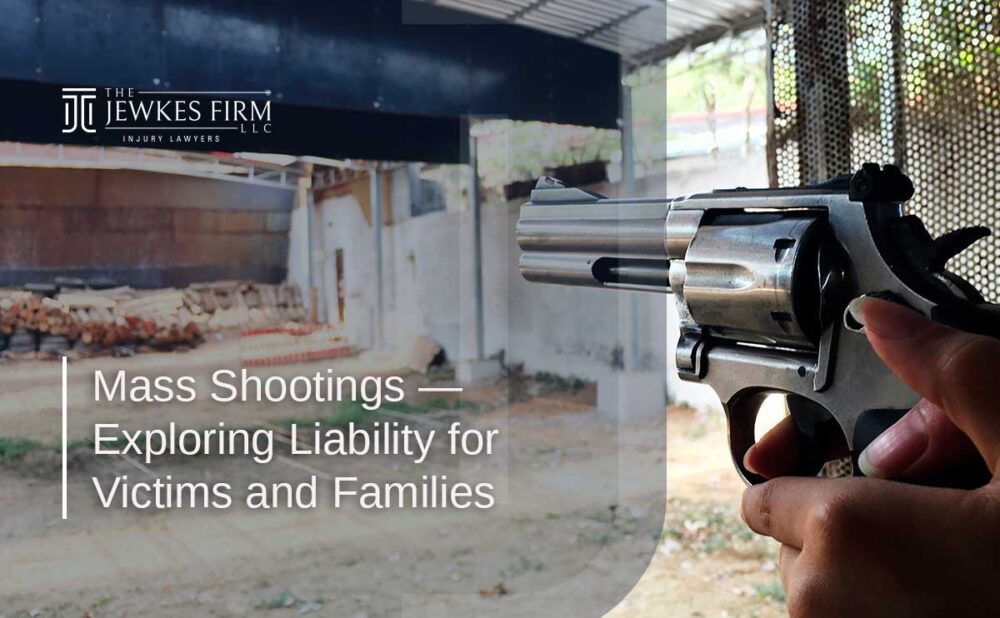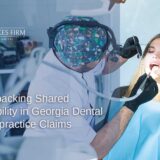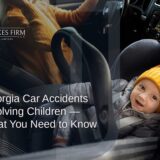The topic of mass shootings is an uncomfortable one. Yet, unfortunately, with mass shootings on the rise, we offer the following educational information about mass shooting liability as a public service to our readers. This blog post does not provide legal advice. Reading this information does not create an attorney-client privilege. Each case is different. If you or a loved one has been impacted by a mass shooting, we recommend that you contact a qualified lawyer in your state. If you represent a business, school, event venue, or other workplace, you should contact your professional advisors for more information.
Mass Shootings — Exploring Liability for Victims and Their Families
Mass shootings are tragic events that leave communities devastated and survivors grappling with physical, emotional, and financial hardships. While the immediate blame often lies with the perpetrator, understanding who can be held accountable is crucial for victims seeking justice and compensation.
At The Jewkes Firm, Attorney Jordan Jewkes helps victims in Georgia navigate the complex legal landscape surrounding mass shootings. This article explains potential avenues of liability, with a focus on Georgia’s unique laws and legal environment, including local case examples.
Victim of a Mass Shooting? Contact Us For A Free Consultation
Victim of a Mass Shooting?
Understanding Liability in Mass Shooting Cases
In Georgia, personal injury and wrongful death claims resulting from mass shootings involve identifying parties responsible for harm beyond the shooter. While the gunman is ultimately accountable, practical recovery often depends on holding other individuals or entities liable under Georgia law. Other potential parties who may be liable in Georgia include:
The Shooter
The person who carried out the shooting is clearly liable. However, shooters tend to be judgment-proof (lacking assets), which means victims must explore other sources of compensation.
Property Owners and Business Operators
Georgia premises liability law requires business owners and landlords to maintain reasonably safe premises. If a property owner failed to provide adequate security or ignored credible threats, they could face liability under O.C.G.A. § 51-3-1 and related premises liability statutes. Factors such as lack of surveillance, insufficient lighting, or untrained security personnel can contribute to a finding of negligence.
Event Organizers
Similar to other premises liability claims, event hosts in Georgia are responsible for protecting attendees. Under Georgia law, they must take reasonable steps—such as hiring security or coordinating with local law enforcement—to ensure safety. In cases where mass shootings happen at concerts, sporting events, or other gatherings, event organizers might be liable if they neglected to implement proper safety protocols.
Security Companies and Guards
Private security services hired to protect a location or event can be liable if they were negligent in performing their duties. If they were inattentive, undertrained, or insufficient in number, liability may arise.
Gun Manufacturers and Sellers
Georgia follows federal standards under the Protection of Lawful Commerce in Arms Act (PLCAA), which generally precludes lawsuits against gun makers and sellers for crimes committed with their products. However, Georgia law does allow claims against sellers who violate state regulations, such as failing to conduct background checks or engaging in illegal sales.
Mental Health Providers
Mental health professionals may be held liable if they fail to act on credible threats or warning signs presented by a patient. For example, if a mental health provider becomes aware of a patient’s intent to commit violence and does not take appropriate action, they could be found negligent.
Family Members
In some cases, family members may be held liable if they knew or should have known about the shooter’s intent and failed to intervene. For instance, a Texas jury found the parents of a school shooter not liable for the violence, but the shooter and the ammunition supplier were held responsible.
Employers
Employers have the obligation to guarantee the safety of their workers. If a mass shooting occurs within the workplace, employers may be liable if they failed to implement adequate safety protocols or address known risks. This includes providing proper training, establishing emergency procedures, and maintaining a secure environment.
Social Media Platforms and Content Providers
In some instances, social media platforms or content providers may be held liable if they knowingly allow harmful content that incites violence. However, legal actions against these entities are complex and depend on various factors, including the platform’s policies and the nature of the content.
Law Enforcement
While law enforcement agencies have a duty to protect the public, they are generally not held liable for failing to prevent a mass shooting. However, if there is evidence of gross negligence or failure to act on known threats, law enforcement may be held accountable in certain circumstances.
Government and Public Entities
Government entities in Georgia enjoy sovereign immunity under O.C.G.A. § 50-21-20, protecting them from certain lawsuits. Yet, exceptions exist, especially if law enforcement was grossly negligent in responding to threats or failed to act on warnings under Georgia’s Governmental Immunity Act.
Others With Prior Knowledge
Georgia law may hold individuals or organizations liable if they had actual knowledge of a threat posed by the shooter and failed to act. This includes schools, employers, or other institutions under a duty to warn or protect potential victims.

Legal Theories Commonly Used in Georgia Mass Shooting Cases
- Negligence. Showing that a party breached a duty of care, leading to the injuries or deaths.
- Premises Liability. Holding property owners responsible for not maintaining a safe environment.
- Wrongful Death. Seeking damages on behalf of victims who lost their lives due to another’s negligence (under O.C.G.A. § 51-4-2).
- Product Liability. In limited cases, holding firearm manufacturers or sellers accountable for defects or illegal sales practices.
Local Georgia Case Examples
While mass shootings are fortunately rare in Georgia, several cases provide insights into how courts have addressed liability issues involving violent incidents and security failures:
Williams v. Best Buy Stores, L.P. (2018) — Premises Liability
In this case, someone assaulted a customer in the parking lot of a Best Buy store in Atlanta. The plaintiff alleged Best Buy failed to provide adequate security and lighting, which contributed to the assault. The Georgia court recognized that property owners owe a duty to protect patrons from foreseeable criminal acts if prior similar incidents or warnings exist. Though this was not a mass shooting, the principles of premises liability stack strongly in cases involving negligent security at public venues.
Baines v. Publix Super Markets, Inc. (2017) — Negligent Security Claims
After a shooting occurred in the Publix grocery store parking lot in Gwinnett County, the plaintiff pursued a negligent security claim arguing Publix failed to take reasonable measures to prevent the violent attack. Georgia courts often evaluate such claims by considering notice of prior criminal activity and whether the defendant acted reasonably under the circumstances.
Doe v. DeKalb County Board of Education (2015) — Duty to Warn
In a tragic incident where someone assaulted a student at school, the Georgia court ruled that school authorities have a duty to warn and protect students from known threats. This case underscores how institutions may be liable if they ignore threats or fail to act on credible warnings about violence, which can be applicable if a school was the site of a shooting.
Georgia Firearms Cases — Limited Liability on Manufacturers/Sellers
Several lawsuits in Georgia involving firearm sales highlight that gun manufacturers and dealers enjoy broad protections under PLCAA and state law. However, sellers who violate state laws—for example, by selling firearms to prohibited individuals or failing required background checks—may be subject to liability. Plaintiffs must present strong evidence of such violations to overcome these protections.
Challenges and Important Considerations for Georgia Victims
Mass shooting cases are legally and emotionally complex. Challenges in pursuing liability claims include:
- Sovereign Immunity. The law protects government agencies and officials unless specific exceptions apply.
- Statute of Limitations. In Georgia, you must file personal injury claims within two years from the date of injury or death, so timely action is critical (O.C.G.A. § 9-3-33)).
- Proof of Foreseeability. Plaintiffs must show that the defendant had actual or constructive knowledge of the risk of harm. Proving that the defendant’s actions or omissions directly contributed to the shooting.
- Compliance with Federal Laws. Federal protections for gun manufacturers often limit claims against those parties.

GEORGIA PERSONAL INJURY LAWYER NEAR ME
How The Jewkes Firm Can Assist Georgia Victims
Attorney Jordan Jewkes and The Jewkes Firm combine deep knowledge of Georgia law with compassionate client support. We help victims:
- Investigate all potentially liable parties, including property owners, event hosts, security providers, and negligent third parties.
- Navigate governmental immunity issues and pursue exceptions to recover compensation.
- Assert wrongful death claims on behalf of grieving families.
- Negotiate with insurance companies to secure fair settlements—or aggressively litigate when necessary.
Our goal is to hold responsible parties accountable and help victims rebuild their lives.
Contact The Jewkes Firm for a Free Consultation
Determining liability in mass shooting cases is complex and depends on various factors, including the actions of the shooter, property owners, employers, and other parties. Victims and their families should consult with an experienced personal injury attorney to explore all potential avenues for compensation.
If you or a loved one has been injured or lost someone in a mass shooting or violent incident in Georgia, do not delay in seeking legal advice. Time limits and complex laws require prompt action. Call (770) 771-5130 to schedule a confidential consultation with The Jewkes Firm and Attorney Jordan Jewkes today.
Frequently Asked Questions
Who is primarily liable in a mass shooting in Georgia?
The shooter is primarily responsible for the injuries and deaths caused by a mass shooting. However, if the shooter is deceased or lacks financial resources, courts may hold other parties accountable.
Can property owners be held responsible for mass shooting injuries?
Yes, property owners may be liable if they failed to provide adequate security or ignored known risks, such as inadequate lighting, poor surveillance, or untrained security personnel.
Does Georgia law allow suing gun manufacturers for mass shooting injuries?
Generally, no. Federal laws such as the Protection of Lawful Commerce in Arms Act protect firearm manufacturers and sellers from liability for crimes committed with their guns, except in cases involving illegal sales or violations of state laws.
Can employers be held responsible if a mass shooting occurs at the workplace?
Employers have a duty to maintain a safe working environment. If a mass shooting occurs due to inadequate safety measures, poor training, or failure to address risks, the employer may be held liable.
Can government agencies be held liable if they failed to prevent a mass shooting?
Government entities have sovereign immunity in Georgia, but exceptions exist if there was gross negligence or failure to act on credible threats.
Are family members ever held liable for a mass shooting?
In certain cases, family members may be held accountable if they knew about the shooter’s intent and failed to intervene. However, proving liability in these cases can be challenging.
How can victims of mass shootings seek compensation?
Victims should consult with a personal injury attorney to explore all possible avenues for compensation, which may include suing the shooter, property owners, employers, or other responsible parties.
What is the deadline to file a personal injury or wrongful death claim in Georgia after a mass shooting?
Georgia law typically gives victims two years from the date of injury or death to file a lawsuit. It is important to consult an attorney quickly to protect your rights.





